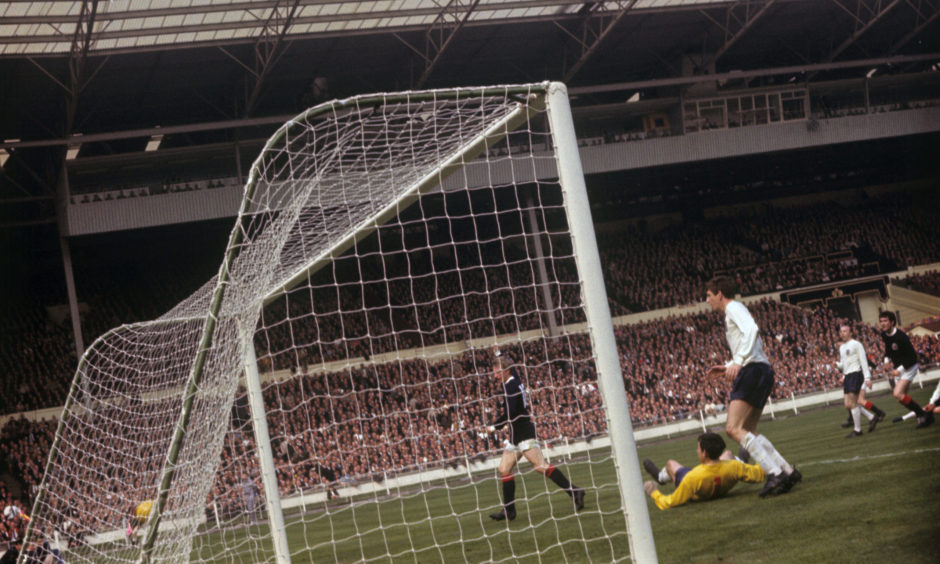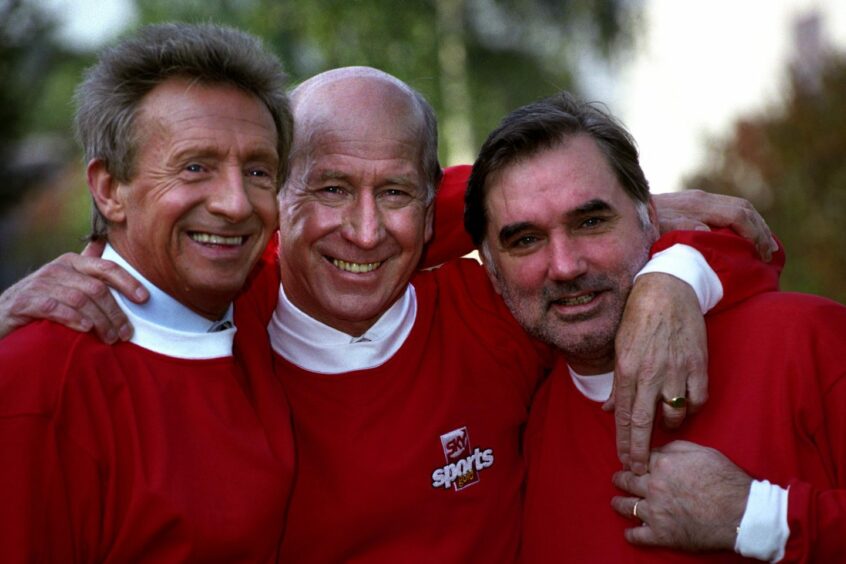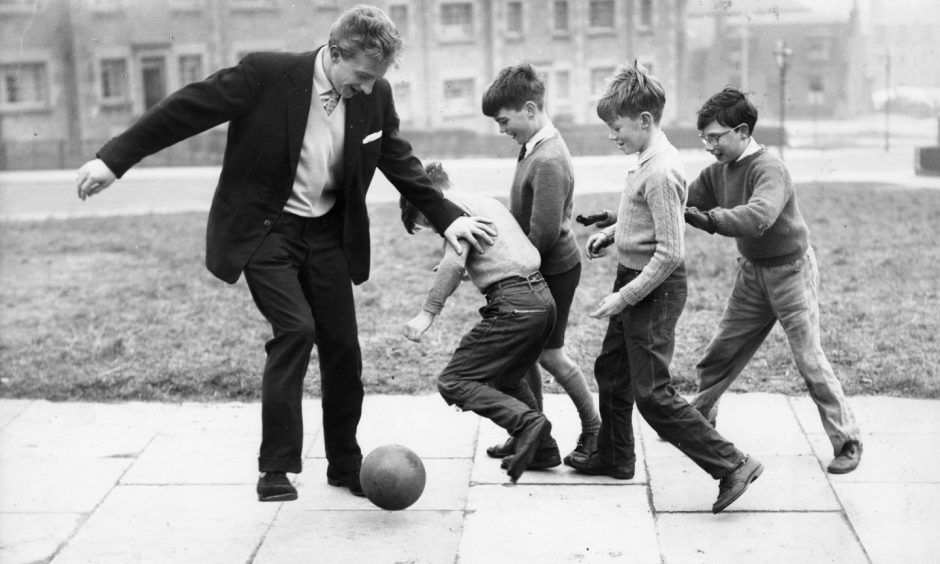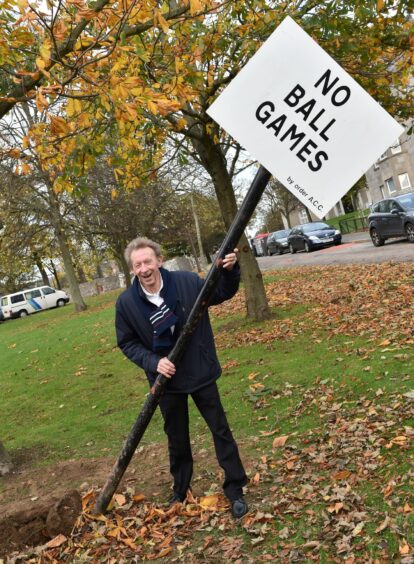Blink and you missed him; the shock of blond hair, the skelf-sized laddie with a magician’s bag of tricks and the ability to leave opponents feeling bewitched, bothered and bewildered.
Denis Law, who has died at the age of 84, was the quiet man from Aberdeen who became a superstar in Manchester and was known throughout Europe as the King.
And even when the TV pictures were in black and white, he did everything in technicolour with a joyous effervescence, which propelled him into the pantheon of sporting legends.
The old newsreels confirm how much joy he brought to so many and the Lawman was one of the most popular figures who ever laced up his boots and sparkled in the spotlight.
In his prime, Law genuinely was a wondrous, mischievous sprite. He dazzled for Scotland when they defeated England 3-2 at Wembley in 1967, shimmered in helping Manchester United become an iconic force who lifted the European Cup a year later, and oozed talent, technical ability and a temperament which handled any setbacks.
And he took cheek from nobody, as a few found out to their cost when tackles crossed the line and the red mist descended. Nobody took liberties, even if it meant him being sent off, as happened several times in Law’s career, which included a 28-day ban for kicking Burnley’s Alan Deakin.
The statistics were remarkable – he scored 30 goals in 55 Scotland internationals, 237 goals in 404 appearances at Old Trafford and helped the club win the First Division in 1965 and 1967 – but they never told the full story of this multi-layered individual.
Instead, that was reflected in his passion for his country and his reaction to the mockery he endured whenever England’s team was in the ascendancy. On the day of the World Cup final in 1966, he was the only person on a golf course in Manchester, attempting to ignore what turned into the biggest celebration of his teammates Charlton and Nobby Stiles’ lives when they beat Germany.
Yet he thought the world of Charlton – “We knew he had survived the Munich air crash [in 1958], and football wasn’t the be-all and end-all. There were other priorities, but we did love our rivalry.”
In his subsequent career, whether in refusing to celebrate his goal which helped consign United to relegation after he moved to Manchester City, or his exhilaration at playing for Scotland at the 1974 World Cup, there was a decency and derring-do stamped in his DNA.
A proud Aberdonian
Even in his ninth decade, the former winner of FIFA’s Ballon d’Or – the only Scot to collect the prize since it was launched in the 1950s – was committed to helping community sport at the grassroots.
And the broad smile on his face as he was presented with the Freedom of Aberdeen in 2017 and waved to the crowd through a veil of happy tears showed that, while he might never have played for the Pittodrie club, he proudly maintained his links to the Granite City.
Quite simply, he was its greatest-ever footballer and always relished returning to his roots for a rowie, a dram and a catch-up with old colleagues from Aberdeen Lads Club as often as possible.
He was never one for standing on ceremony when he could enjoy a fish supper at The Ashvale, but there again, there was nothing flash about his background in a council house at 6 Printfield Terrace.
This was in another time, another place from the current situation where elite players dwell in a different stratosphere from their fans.
As Law, born on February 24 1940, recalled: “Dad was a trawlerman, someone always at sea, and I was gone at 15, so I never really knew him man to man, which is something I always regretted.
“I once went out with him on a boat and, as the swell increased, I knew that job wasn’t for me and it was all I could do to keep my breakfast inside me.
“Life was basic in Aberdeen, it was very down to earth. Clothes were paid for on tick, music was a comb-and-paper and Christmas was a Dinky car, a tangerine, a packet of Spangles and an uncrackable nut – but the lad next door would have got no more.
“I was only a little boy, undernourished, under-developed, and weighing in at eight stone with a terrible squint. But then the chance came out of the blue to go for a trial with Huddersfield Town.
“I didn’t even know where Huddersfield was.
“The furthest we had ever been as a family was Stonehaven, so this was a huge adventure, and a shock to the system for everyone.
“When I went down there, my starting wage was £4 a week, and once I had paid my digs, I only had £1 left. But the cheapest fish supper in town cost a shilling so I survived, and it was a privilege to be paid to play football when many others didn’t have the same opportunity.”
He has always told these stories with a sparkle in his eyes. Many former stars gradually turn into miserable old curmudgeons, forever complaining that things aren’t as good as they used to be.
But Law was involved in a variety of different projects, whether unveiling a statue of himself at Aberdeen Sports Village, backing a council initiative to remove No Ball Games signs from his home city, or returning in 2021 to peer wistfully on a resplendent sculpture of himself in Marischal Square, with confrere Sir Alex Ferguson for company.
Even in his 70s, the Lawman still had traces of the same blithe boy who didn’t receive his first pair of boots until he was a teenager, but who subsequently developed into one of his country’s true nonpareils, despite an initial inability to see properly.
As he recalled, of those early days in the Granite City: “My young life revolved around playing football. There was no television then and people lived by their radio sets.
“All the kids did was play in the streets. You kicked a ball against the wall all the way to school, then you had a game when you got there.
“I couldn’t wear glasses to play in a proper match, so I developed a unique system for coping with it by playing with one eye closed. I kept my glasses on as long as I could, while I put on my jersey and socks and boots, but when the moment came to go on to the pitch, I used to close my right eye and keep it closed for the whole of the match.
“I learned to play through an entire match using only one eye and I went on doing it for years. It’s a simple game – there’s you and a football and your team mates. If you all train together and love it, you soon get to know what you’re doing.”
A champion of youth sport
Perhaps his vision wasn’t of the 20-20 variety. But he routinely revelled in looking at the bigger picture and providing youngsters with opportunities to play sport.
If you venture to the north-east, you’ll soon discover that there isn’t just a Denis Law Legacy Trust, but also a thriving Streetsport initiative, which now reaches out to many different areas of Aberdeen and nurtures and nourishes thousands of youngsters.
This is something which Law actively encouraged and he told me three years ago: “I don’t like to hear how much it costs to join clubs or attend summer camps nowadays because it just rules out so many less privileged young people.
“That is where the Streetsport programme comes in, it allows sport to be inclusive for all, and not just those whose families can afford it. Just hearing about the impact that our work has on the lives of young kids makes me feel very proud.”
Many will feel the same emotion towards Law and his contribution to enhancing people’s lives wherever he journeyed. Indeed, although he struggled with dementia in his later years, he will forever be remembered as the laddie with a tanner ba’ at his feet, whose myriad achievements and exploits are recorded in the foyer at Aberdeen Sports Village.
As Sir Alex said: “We all need role models in life. Denis was a year and half older than me. I looked at him and thought: ‘That’s what I want to be.”
As a special talent, who shrugged off making a fuss about how special he actually was, the Lawman might be gone. But he’ll never ever be forgotten.






Conversation